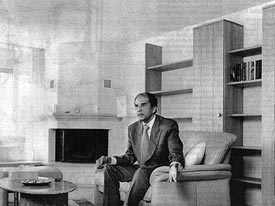
Philosophy of the Desert - The Writer Ibrahim al-Koni

Ibrahim al-Koni, lives and works in Goldiwil.
By Aurel Schmidt
For someone traveling through the desert it will be as if seized by a virus. It’s a wonderful, magic but also a menacing place hostile to life. Of men entering it, it demands being ready to let themselves in for an existential adventure. One has to stand up to the desert. Individualistic escapades are not allowed.
To Libyan writer Ibrahim al-Koni the desert is home. He is a Targi, a member of the Tuareg people, at home between Algeria, Libya, Niger and Mali. He knows the local conditions.
In his works, the desert comes first. Al-Koni describes it in ever new poetical rhapsodies: its force, its extreme loneliness beneath burning skies, its poetry and its fascination. He speaks about the “roadless desert”, the “great eternal vastness”, about “naked plains”. The desert is the “promised land”, also the “land of god” – but only for the ones complying with its severe laws.
What’s noticeable is that in these stories individuals appear only rarely; in most cases they are described as “the tribal chieftains”, “the wandering seer”, “the messenger”, “the sorcerer”, “the understanding ones”, etc. On the other hand there are rather anonymous spiritual, magic powers as agents of action in the foreground: snakes, djinns, fever that spreads and seizes people; stones that live; evil, madness, the wind, the word, the law. There are animals among them, too.
And if man appears he’s not free. He has to adapt himself to the conditions, the desert’s order. Following them he’ll find some kind of happiness, of quote, “redemption”, unquote. In a story entitled “My Desert” the girl Tasidert wants to know: why did God create the desert as a desert? The answer she’s getting is a succinct and revealing one: In order that it serves as a place of refuge to the one who wants to be free.
This kind of freedom cannot be had for nothing. At first, examinations have to be passed. “Man gives up his life searching for the lost self, and upon finding it he is fascinated, he dances with joy and falls into ecstasy,” it reads in “The Lady Made of Stone”. And in “My Desert” one reads: “Man must die in order to be free”. That’s the only way to freedom.
When man is talked into settling down (like in the novel “The Magician”) he seals his fate. Someone giving up travels, i.e. the search for Waw, the unreachable city, paradise that’s not of this world, this someone is lost. Therefore, the “roadless desert” according to al-Koni has the deeper meaning of life as never-ending travels. What al-Koni proclaims is the philosophy of the desert.
A moral rigorousness finds expression in al-Koni’s works. Often man succeeds only with difficulty – and often not at all – to stick to the laws of the desert. In most cases it feeds something al-Koni simply calls “greed”.
Somebody who gives in to this outrage will be punished. Here, al-Koni applies surreal stylistic devices. In order to escape his tormentors Assuf (“Bleeding Stone”) turns into a moufflon and the following happens: “The mountain split in two, the sun darkened, and the edges of the wadis disappeared in the eternal, virtually impassable deserts.” In the story “Gold on the Mountain” which al-Koni “dedicated to Switzerland” – in “My Desert” – a hermit is being buried alive by people who assume that he’s keeping a treasure which doesn’t exist in the end. Later on it turns out that the coffin is empty. Upon which all sources dry up. One is tempted to think of the Blüemilisalp Saga in Switzerland.
In the works of al-Koni cultures and narrative styles join across borders and the realistic and the fantastic permeate each other to become an original unity. The desert turns into a cosmic scene of effective powers. In the end, man who has proven his worth will be rewarded with something, indescribably, exceeding language – as if one had done a short crucial look over a mysterious boundary, from which one recovers nevermore.
One can call al-Koni’s mix of Tuareg tradition, magic and Islam eclectic but it’s the road leading to the epos as genre about which, rationally, there’s nothing I can do. The order of the world is not of this world. It is given and has its origin elsewhere, but where? To find this out is the task of those who have set out on the road of knowledge.
